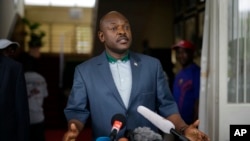Burundi's President Pierre Nkurunziza has intensified his re-election bid ahead of the July 15 presidential poll, according to presidential spokesperson Gervais Abayeho.
“The president is on a campaign trail in the last few days and people are turning out in large numbers from his CNDD-FDD party, and the operation is going quite well in the countryside and even the capital, Bujumbura,” said Abayeho.
But opposition groups say they will not participate in the election, after accusing Nkurunziza of undermining the constitution by seeking a third term.
They say the political environment is not suitable for credible elections, citing the violence and security concerns that prompted more than 100,000 Burundians to flee to Rwanda and other nearby countries.
U.N. observers reinforced that argument Thursday, saying that this week's parliamentary elections in Burundi were not free, fair, transparent or credible.
The U.N. electoral observer mission said Monday's elections took place "in a tense political crisis, and a climate of widespread fear and intimidation in parts of the country."
Opposition groups also said that a lack of of opponents in the presidential election would sharply diminish the transparency of the vote.
Abayeho disagreed, noting that opposition parties took part in Monday's parliamentary elections.
“The president is not running a one-man show,” said Abayeho. “They said they were boycotting the election, but the last local and legislative elections showed that members of those opposition parties have actually reported to vote, and one of the key opposition [leaders], Agathon Rwasa, actually came number two in the last local and legislative elections.”
Abayeho said the administration has urged the refugees to come home. But opposition groups say violence has not abated, and that it is unacceptable for the government to call for the refugees to return when the situation is not stable.
The presidential spokesman said the refugees are nevertheless coming home. “These people have been coming back in numbers. I don’t have the numbers but what I know is that these people have been coming back from Rwanda, from Tanzania, from DRC, from Uganda,” he said.
“When we went to the election in 2005, close to 1.5 million people were outside the country because of the civil war, which lasted for over 10 years, [but] this didn’t prevent the election from taking place," he said. "The number of people outside cannot lead us to saying that the election will not be credible, because there are people who are outside. It is really not a significant number to lead people to draw such a conclusion.”
The European Union and the African Union have said they will not monitor Burundi's presidential election.
Abayeho says the government was surprised by the EU's and AU's decisions. He says other poll groups are welcome to monitor the proceedings.
“The government of Burundi is calling for anybody who wants to follow this [election] to come into the country so that they can know the truth on the ground,” said Abayeho. “If the AU has pulled their observers this does not mean that the process is going on behind closed doors. There are other observers in the country. The U.N. observer mission [is] here on the ground ... and also the European parliamentarians.”





